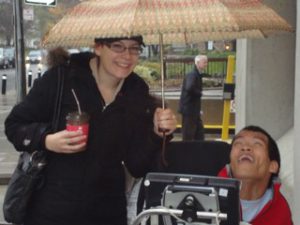Communication Assistance Course

This course has been developed by Communication Disabilities Access Canada (CDAC) with a funding contribution from the Government of Canada’s Social Development Partnerships Program – Disability Component.
What is this course about?
The course is about general ways to assist individuals who have speech and language disabilities if they need support communicating with other people. The course focuses on the unique role of a person who provides communication assistance.
If you are more interested in learning how to interact with a person who has a communication disability – not in techniques to assist them communicating with other people, then you may want to check out our free e-learning modules on our website at http://www.communication-access.org/make-your-service-accessible/make-your-services-accessible
What is the cost?
The course is free until January 31, 2019. After that, the course will be offered on a pay for view basis.
Who might need communication assistance?
It is important to note that not everyone who has a speech and language disability needs or wants communication assistance from another person. However, there are other people who do want support when communicating in certain situations, especially at meetings and important appointments. This course focuses on communication assistance for people who:
- Are over 18 years of age
- Have a speech, language and communication disability and may have:
- Unclear speech
- A picture, symbol, letter board
- A communication device
Why do some people need assistance with communication?
Some people may need communication assistance when communicating with people who:
- Do not know them
- Do not know how they communicate
- Do not understand what they are communicating
- Do not respect them
- Who do not give them information in ways they can understand
- Do not take what they are communicating seriously
- Do not give them sufficient time to communicate what they want to say
Who can take this course?
Anyone who supports a person with a communication disability in the community and/or is a:
- Personal Support Worker
- Personal Attendant
- Communication Disorders Assistant
- Communication Health Assistant
- Direct Service Professional
- Family Member
- Friend
- Disability Advocate
- Student in a Disability Area
In addition, a person with a communication disability can take this course to help them train their personal assistants.
What will you learn in the course?
There are 6 lessons in this course. Lessons can take from 20 minutes to an hour to complete.
Lesson 1: People who have Communication Disabilities
Lesson 2: Facilitating People to Communicate their Messages
Lesson 3: Facilitating People to Understand what Others are Saying
Lesson 4: Facilitating Successful Interactions
Lesson 5: Facilitating Communication at Meetings and Public Forums
Lesson 6: Database of People who can Assist with Communication
Who are the course instructors?
Instructors include:
- People who have communication disabilities
- People who provide communication assistance
- Speech Language Pathologists
- Augmentative and Alternative Communication Clinicians
What is the format of the course?
The course includes:
- Slides with text
- Captioned videos of instructors discussing key roles of communication assistance
- Simple quizzes
- Handouts and resources
What will you get by taking the course?
You will get:
- General guidelines on ways to assist people communicating
- A certificate of completion at the end of the course
- Canadian participants have the option to be on the CDAC database for potential engagements for communication assistance work. The database can be viewed at http://www.cdacanada.com/communication-assistance-database/
This course is not accredited and does not qualify participants:
- To use the term Communication Assistant as a professional title
- To work as a Communication Disorders Assistant, who provides clinical services under the direction of a Speech-Language Pathologist
The course will not prepare you to:
- Support people who do not have established communication methods or skills to communicate
- Assist people with significant intellectual disabilities to communicate
- Assess, introduce communication methods, provide therapy or communication services
- Recommend, develop communication displays and devices
- Support a person communicating in critical contexts such as in significant healthcare, police, legal or justice situations. These services are provided by Speech-Language Pathologists, and Augmentative Communication Clinicians.
How do you take the course?
- The course is online in English and French.
- You must have your own personal email to take the course.
- It takes approximately 2-3 hours to complete the course.
- You can do the lessons anytime between Sept 24, 2018 – January 31, 2019.
- There is a short quiz at the end of each lesson.
What is the communication assistance database?
On completion of the course, Canadian participants may or may not choose to have people and organizations contact them for occasional communication assistance work.
Participants interested in applying to be on the database, must complete the course and submit their application by 5 pm ET, January 31, 2019.
The database can be viewed at http://www.cdacanada.com/communication-assistance-database/
Any communication assistance work obtained through the database is freelance. CDAC does not promote or pay for communication assistance work. CDAC cannot endorse or take any responsibility for work provided by people who assist with communication.
Information about the database is provided during the course.
This course was first offered in January 2018.
- 1,101 people registered to take the course.
- Participants included personal support workers, attendants, direct service professionals, family members, nurses, disability advocates, and others who support people with disabilities in the community
- 98% reported they were highly satisfied or satisfied with the course and would recommend it to others.
CDAC is pleased to offer this course at no charge until January 31, 2019.
Course is available to be taken anytime between: Sept 24, 2018 and January 31, 2019.